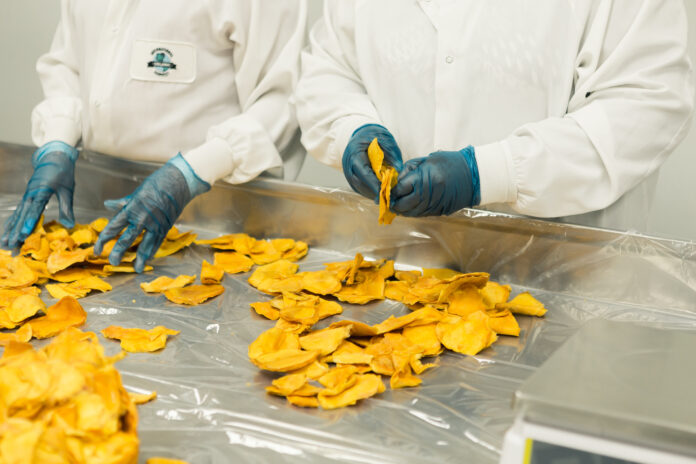
By Tom Moore, Senior Management Consultant at TBM Consulting Group, Inc.
Lean management, often thrown around as a buzzword, particularly in the food processing industry, is all about enhancing efficiency using lean principles in food processing plants. At its core, lean principles aim to eliminate every ounce of non-value-added activity, or waste, from the manufacturing process. What does “waste” mean in this context? It’s anything that wouldn’t be considered valuable in the final product by those who matter most: customers.
In the context of the food processing industry, customer value is multifaceted. It includes factors such as quality, safety, taste, and nutritional value, all of which must be upheld throughout the production cycle. Lean management challenges organizations to align their processes with the goal of continuously improving customer value, ensuring that every activity contributes to the end product that customers are willing to pay for.
So, how do we apply lean management in the food processing industry? It boils down to a suite of tools, techniques, and principles designed to root out inefficiencies. Central to the lean approach are two foundational concepts: the Five Lean Principles, which guide the strategy, and the identification of the Seven Deadly Wastes, pinpointing where inefficiencies most commonly persist.
Applying the Five Lean Principles
Implementing lean management in food processing involves integrating a set of tools, techniques, and principles, particularly the Five Lean Principles. Here’s how these principles can be practically applied in a food processing context:
- View processes from the customer’s perspective: Begin by mapping your entire production process and identifying elements that your customers value most. This might include quality, speed of delivery, or specific product features. Understanding these values allows you to prioritize actions that enhance what’s most important to your customers.
- Identify value-adding vs. non-value-adding steps: Scrutinize each step of your production process to separate value-adding activities from waste. For instance, excessive movement of materials might be identified as a non-value-adding activity and thereby targeted for elimination or reduction.
- Streamline your process: Analyze your process flow to identify bottlenecks or delays. Implementing solutions such as reorganizing the production layout for smoother flow or adopting just-in-time manufacturing can help eliminate these inefficiencies.
- Align with customer demand: Develop a flexible production system that can quickly adapt to changes in customer demand. This might involve adopting technologies that allow for rapid scaling or diversification of product lines in response to market trends.
- Foster a culture of continuous improvement: Encourage every employee to contribute ideas for improving processes and reducing waste. Regularly review performance, celebrate successes, and iterate on the process to foster an environment where excellence is continuously pursued.
Identifying and eliminating the Seven Deadly Wastes
To further drive home the practicality of lean management in food processing, it’s essential to tackle the Seven Deadly Wastes directly. By recognizing and mitigating these wastes, companies can significantly enhance their operational efficiency. However, acknowledging an often-overlooked aspect — referred to as the eighth deadly waste — provides a more comprehensive approach to waste elimination.
- Overproduction: Avoid producing more than what is immediately required. This can be managed through better forecasting and adopting a just-in-time production approach, ensuring you produce only what is needed based on customer orders.
- Waiting: Identify and eliminate downtime in the production process where no value is being added. This might involve streamlining the workflow to ensure a continuous movement of materials and products or improving coordination between different production stages.
- Transport: Minimize the unnecessary movement of raw materials, work-in-process, or finished goods. This can be achieved by optimizing the layout of the production floor to ensure that materials and products move the shortest possible distances.
- Motion: Reduce non-value-adding movements by people within the production process. Ergonomic improvements and efficient workspace design can help minimize unnecessary movements, thus saving time and reducing fatigue.
- Overprocessing: Eliminate processes that don’t add value to the customer. This can involve evaluating your production methods and removing redundant steps that don’t contribute to product quality or are not required by the customer.
- Inventory: Keep inventory levels as low as possible without risking stockouts. Implement inventory management techniques such as Kanban systems to align inventory levels more closely with actual demand.
- Defects: Strive to reduce the production of defective items, which require rework or scrapping. Implementing quality control measures at every stage of the production process can help identify and correct defects early, preventing waste.
- Unused human potential: This eighth waste represents a significant loss to companies when the skills, creativity, and potential contributions of employees are not fully utilized. Combatting this waste involves:
- Empowering employees: Encourage the sharing of ideas and feedback at all levels. Recognize and reward contributions that lead to process improvements and innovation.
- Investing in training and development: Offer continuous learning opportunities to help employees expand their skills and grow within the company, thus ensuring their potential is fully utilized.
- Fostering a creative environment: Create a culture that values innovation and creativity. Encourage experimentation and the exploration of new ideas without the fear of failure.
- Utilizing cross-functional teams: Form teams from different areas of the operation to tackle specific challenges. This diversity can spark creativity and uncover unique solutions to complex problems.
Implementing lean management with a focus on waste reduction
Integrating the Five Lean Principles and actively identifying and eliminating the Seven Deadly Wastes can transform the efficiency of food processing operations. Here’s a practical approach to making this a reality:
- Engage your team: Involve employees at all levels in identifying where these wastes occur in your operations. Use regular meetings and workshops to brainstorm solutions.
- Continuous monitoring: Set up systems for continuous monitoring of production processes to quickly identify areas where waste is occurring. Digital tools and software can provide real-time data to aid in this analysis.
- Training and empowerment: Provide training for your team on Lean Management principles and the Seven Deadly Wastes. Empower them to make changes that reduce waste in their day-to-day activities.
- Review and adjust: Lean management is an iterative process. Regularly review the impact of changes made to reduce waste and be prepared to adjust your strategies based on what the data shows.
Realizing operational excellence through lean management
Lean management in food processing not only boosts efficiency but directly meets customer demands by eliminating waste and prioritizing value. This approach is anchored in the Five Lean Principles, focusing on enhancing what customers value most — quality, safety, taste, and nutritional content — while eliminating inefficiencies through a clear identification of the Seven Deadly Wastes, plus addressing the often-neglected aspect of unused human potential.
The practical application of these principles involves a deep dive into process optimization, encouraging a culture where every employee’s ideas for improvement are valued. By refining processes, aligning production with customer demands, and fostering continuous innovation, companies can achieve a more streamlined operation. Lean management transcends traditional efficiency improvements to embody a comprehensive strategy of excellence and value creation, making it a key driver for operational success and customer satisfaction in the food processing industry.
 Tom Moore, Senior Management Consultant at TBM Consulting Group, has built a progressive career leading manufacturing companies and departments across Maintenance, Engineering, and Facilities in food manufacturing, industrials, large equipment, and landscape products. He has worked at Lyons Magnus (Food Packaging), Kellogg’s / Keebler, Inline Engineers (Engineering Services Provider), Trauth Dairy / Dean Foods, Pavestone (Concrete Landscape Products), Kraft Foods, Thrall Car (Freight Cars) and Inland Steel (Steel Mill). Most recently, he was the Director of Maintenance and Senior Manager of Engineering and Facilities at Lyons Magnus.
Tom Moore, Senior Management Consultant at TBM Consulting Group, has built a progressive career leading manufacturing companies and departments across Maintenance, Engineering, and Facilities in food manufacturing, industrials, large equipment, and landscape products. He has worked at Lyons Magnus (Food Packaging), Kellogg’s / Keebler, Inline Engineers (Engineering Services Provider), Trauth Dairy / Dean Foods, Pavestone (Concrete Landscape Products), Kraft Foods, Thrall Car (Freight Cars) and Inland Steel (Steel Mill). Most recently, he was the Director of Maintenance and Senior Manager of Engineering and Facilities at Lyons Magnus.

Credit: Source link














